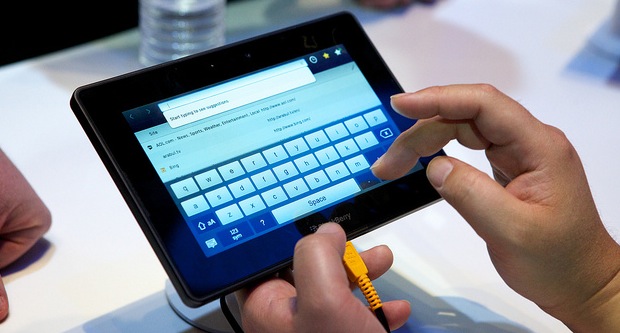PlayBook has a Flash-filled future; RIM's worst decision to date?

Research in Motion plans to continue supporting Adobe Flash, days after it emerged that the platform was not only on its last legs, but that it was to be taken round the back of the stable and beaten over the head with a rusty spade.
In a statement on the company's corporate blog, the BlackBerry maker said:
"Earlier today, Adobe announced plans to stop investing in Flash® for mobile browsing, and focus more efforts on HTML5. As an Adobe source code licensee, we will continue to work on and release our own implementations, and are looking forward to including Flash 11.1 for the BlackBerry PlayBook."
At roughly 10am this morning, a collective face-palm slapping sound was heard across the United States and Canada.

It is as though the BlackBerry maker is purposefully trying to continually do things to deliberately lower its stock price. I'm serious; is this some game show that I'm not aware of, where contenders win a vacation to the Bahamas if they successfully cripple their company within the space of a year?
The PlayBook has hardly been the most popular tablet the market has seen in recent years. In fact, come Christmas, I would place money that out of the 'major players', including Samsung, Motorola, and obviously Apple, that Research in Motion's tablet will still come bottom of the pile.
But to continue to support an already dead platform on a dying tablet is like throwing salt in the wound of an already squashed slug.
It's not the best analogy I should have come out with, but you get the idea.
Granted, the PlayBook does support HTML5, at least giving the tablet a break from a major software update that would be necessary to effectively replace the world's most used web plug-in. It saves on a lot of headaches down the line, which from the perspective of future proofing was not a far off move.
The Ontario-based company will have the ability to continue to develop Flash on its own moving forward, keeping a 'healthy' following of developers interested and supported -- that is, if you considered the aforementioned slug analogy to be healthy.
The PlayBook never really stood a chance, stood in line like the nerdy, glasses-wearing kid next to its prom-queen older sister. Even when the PlayBook had a chance to shine, in its secure emailing client that emulated the BlackBerry enterprise encryption, the tablet launched without it. In effect, its most favourable feature was left behind its launch.
But the linchpin to the PlayBook has always been its less than desirable advertising.
Nearly all of the company's advertising and marketing efforts have been on the fact the PlayBook, unlike the iPad, as the supreme competitor to all other tablets on the market, will support Flash-based content. Though it still will, and Flash will not suddenly drop off the edge of the planet in the next few months, the BlackBerry maker is going to have to think of a brand new marketing strategy.
At least now Research in Motion can advertise the PlayBook as something it should have been marketed as a long way back: "The most expensive paperweight you never needed in the first place".
Rant over.
Related:
- Exclusive: Adobe ceases development on mobile browser Flash, refocuses efforts on HTML5
- Four pleasant surprises in the BlackBerry PlayBook
- Research in Motion recalls PlayBook tablets over faults
- Is the BlackBerry PlayBook competitive enough?
- RIM faces PlayBook, corporate-focus challenge as weak results forecast
- RIM launching PlayBook without native email client; Shoots itself in both feet